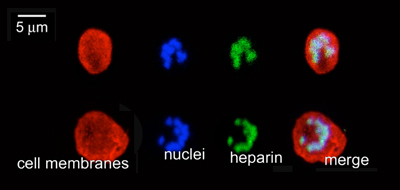The IBEC/ISGlobal joint Nanomalaria unit, together with their collaborators at the Institute of Nanoscience and Nanotechnology Barcelona (IN2UB) and the Universidade Federal do Rio de Janeiro, looked to the ocean for their solution to this problem. In heparin-like molecules from sea cucumbers, red algae and marine sponges (pictured), the researchers found that the anticoagulant properties were much reduced.
“Marine organisms are a rich source of sulfated polysaccharides similar to heparin,” says Joana Marques, first author on the paper. “However, such molecules have anticoagulant activities sufficiently small to be used in circulating blood at their active concentrations without incurring the risk of internal bleeding.”

“In vitro experiments that we did with all these compounds demonstrated significant inhibition of Plasmodium falciparum growth even at low-anticoagulant concentrations, and preliminary in vivo assays in mice certainly look promising,” says Xavier Fernández-Busquets, group leader of the IBEC/ISGlobal Nanomalaria joint unit. “With heparin slowing down invasion of red blood cells by Plasmodium, the resulting prolonged exposure of the parasite to circulating lymphocytes gives the immune system a stronger chance to build up defences.”
Their discovery means that heparin-related molecules can now be explored for the design of new therapeutic approaches against malaria where polysaccharides with low anticoagulating activity could play a dual role as drugs and to encourage immune response.
Xavier Fernández-Busquets will be giving a seminar, A Short (Hi)story of Malaria, at IBEC on Friday May 20th at 10:00am.
—
Source article: Joana Marques, Eduardo Vilanova, Paulo A. S. Mourão and Xavier Fernàndez-Busquets (2016). Marine organism sulfated polysaccharides exhibiting significant antimalarial activity and inhibition of red blood cell invasion by Plasmodium. Sci Rep 6, Article number: 24368
—
IBEC in the media:
La Vanguardia, “Descubren una posible solución para la malaria en el fondo marino”
Agencia SINC, “La solución para la malaria podría estar en el fondo marino”
Te interesa, “Investigadores descubren una posible solución para la malaria en el fondo marino”
La Vanguardia (Big Vang), “Pepinos, algas y esponjas marinas para curar la malaria”
Ecodiario, “Investigadores descubren una posible solución para la malaria en el fondo marino”
Ecoticias, “Los fondos marinos podrían curar la malaria”
NCYT, “Buscando solución para la malaria en el fondo marino”
Diario Médico, “Hallan propiedades antimaláricas en azúcares derivados de organismos marinos”
Gaceta Médica, “Hallan propiedades antimaláricas en azúcares derivados de organismos marinos”
Noticiero Universal, “La solución para la malaria podría estar en el fondo marino”
Diario Siglo XXI, “Investigadores descubren una posible solución para la malaria en el fondo marino”
Catalunya Vanguardista, “Organismos marinos contra la malaria”
El Correo de Andalucía, “Descubren una posible solución para la malaria en el fondo marino”
Ciencia Explora, “La solución para la malaria podría estar en el fondo marino”
EuropaPress, “Descobreixen una possible solució per la malaria en el fons marí”
La Información, “Investigadores descubren una posible solución para la malaria”





